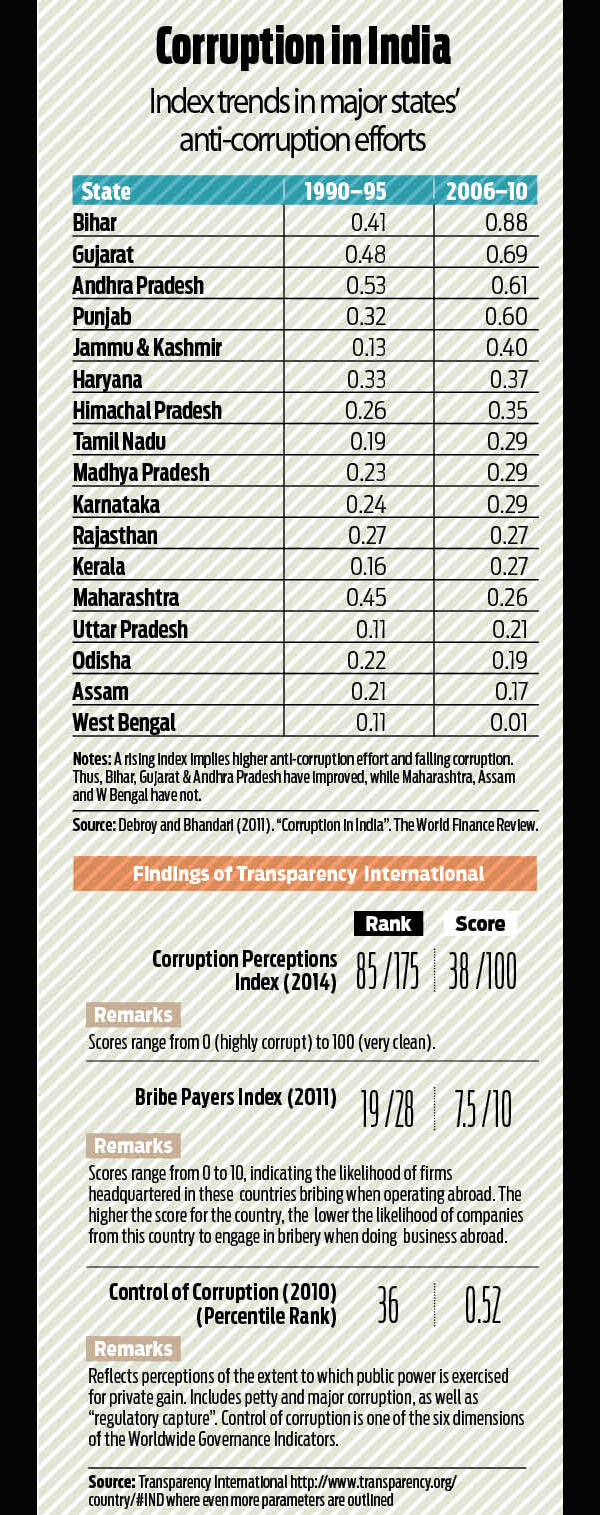The stench of bribery is up in the air once again. This time, it is disclosure that a US company, Louis Berger, paid bribes to two Goa legislators to win a contract. At least one of them has been chargesheeted and arrested.
Curiously, according to media reports, some Indian managers of the company, who worked with Louis Berger, have also been picked up for investigation. While it is too early to predict the outcome of the case in India, it is quite conceivable that the Indian managers will testify that no bribe was paid, and the legislators might be let off the hook.
But why would the Indian managers claim that no money was paid (even though the names of the bribe takers have been given out by the US Department of Justice)? That’s because Indian laws clearly state that both the bribe giver and the bribe taker must be penalised. According to the Corruption Act 1988, “Whoever abets any offence [pertaining to bribery], whether or not that offence is committed in consequence of the abetment, shall be punishable with imprisonment for a term which shall be not less than 6 months but which may extend up to five years and shall also be liable to fine.” Surely, no Indian manager would like to go to jail!
This is the law that is primarily responsible for abetting the spiralling rate of bribery and corruption in India. If both the giver and the taker of the bribe are to be penalized, how will any evidence ever get collected, unless it is by a third party?

Even if I record the act of bribe taking (a better word for this is often extortion) on my mobile phone, or audio tape the conversation, or even copy the serial numbers of the currency notes I have given to the official, I am guilty. The moment I present the evidence to the police, I risk getting arrested myself.
Remember how, despite witnesses coming forth to testify in the cash-for-votes scam, nobody got penalized. The same happened when the Narasimha Rao government was held responsible for bribing another political party to win its votes. As of now, the present government has not cared to reopen either of the two cases.
So what should the government do? The answer is simple. Amend the law so that the bribe taker is the guilty person, and the bribe giver is allowed to become a witness and is not subjected to criminal or civil proceedings. Just this change of law will immediately restrain many government officers from ‘extorting’ money from people who want their applications cleared.
They will not dare ask for the bribe, lest the bribe giver turns approver, or complainant. Today, he is brazen because he knows that the bribe giver himself could get arrested if he dares to complain.
In fact this is what Kaushik Basu, former chief economic advisor, government of India, recommended in his March 2011 paper titled “Why, for a Class of Bribes, the Act of Giving a Bribe should be Treated as Legal“.
But how rampant is bribery?
Transparency International has a few interesting numbers (see chart). Each of the numbers tells a story which would make any self-respecting law abiding Indian cringe with embarrassment. It estimates that truckers alone pay annually Rs222 billion (US$ 4.5 billion) in bribes. It also estimates that government regulators and police share the bribe money, in the ratio of 43% and 45% respectively.
And if the figures of Bibek Debroy and Laveesh Bhandari are anything to go by (in their 2011 paper titled “Corruption in India”, documented by Wikipedia), public officials may be cornering as much as ₹ 921 billion ($18.42 billion), or 1.26 per cent of the GDP, through corruption. The paper claims that most bribery is in the transport industry, real estate and government delivered services. Most belong to India’s unincorporated sector (http://dnai.in/cPXT).
And do note that this was in 2011 when the Indian economy was a bit smaller, and corruption a wee bit less. The figures could be substantially higher today.
Take other figures that Debroy and Bhandari have given. While some states like Bihar, Gujarat, Andhra Pradesh and Punjab have begun cleansing themselves of the taint of corruption, others like Maharashtra, West Bengal, Odisha and Assam have seen corruption increase.
And as Ram Jethmalani, noted lawyer and former legislator, points out (http://dnai.in/cPiX), corruption has led to the generation of black money which could be as much as $1.5 trillion or Rs90 lakh crore.
If the government is serious, there is another law it should amend. It must allow any citizen to file a criminal case of extortion (or corruption) against a public servant. Currently, India’s laws do not allow for a public servant to be prosecuted, till his higher ups permit the registration of such a case. Since the proceeds of corruption/bribery is often shared with the higher-ups, it is inconceivable that such permissions will be forthcoming. India’s legislators need to amend this law.
In this context, it must be mentioned that the Indian courts have already ruled that once there is prima facie evidence of corruption, further clearances from higher-ups are no longer required.
Now it is up to the legislators to walk the talk. Will it amend the two laws referred to above? Our guess is as good as yours.





































COMMENTS